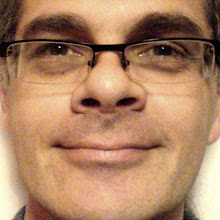The third concert of the Plug festival 'Music Lab Does Theatre' was incredibly strong. First up was Chris Duncan's Every Little Hurts, four harps plus a soprano who also played glockenspiel; a stunningly good piece singing and acting by Claire Thompson, in a checkout-girl pinafore, looking bored and dowdy, pecking away in a desultory way at the glock, and singing about… well, actually, I couldn't make out any of the words, but something about the sadness of supermarkets, one assumes. Various other wee bits of colour in the piece to give us some hints in this direction, occasional supermarket-style announcements coming over the loudspeakers, conductor Bryan Allen in costume, some props. A very nice sounding piece, how can you go wrong with four harps plus glockenspiel, really sold by Claire's performance, exactly the kind of 'I get it' singer which every composer would want to work with.
The next piece was an entertaining what's-not-to-like piece Building Goliat by Claire McKenzie, with percussionist Calum Huggan mugging through the business of putting together a piece of flatpack furniture to a musical accompaniment provided by a an eleven piece ensemble of four saxes, five strings, piano and drums, conducted by Bede Williams. Actually, I kind of did find some things not to like about this piece, essentially to do with the kind of so-called 'music theatre' we were getting here. The hint is in the word 'mugging'; the furniture-building was overacted, while the musicians were, um, underacting? Not part of the theatre at all. The music was good, especially in the sections where the drumkit cut in, things got distinctly jazzier and the ensemble started to hang together better in rhythmic terms.
Joshua Payne's Should'nt've. Should've. Should'nt. Should. was a stunning tour de force, that's the only way to describe it, with Josh both composing and dancing the piece himself. His presence on stage was strong, dominating, tying his left leg to the stage with a length of rope before executing… well, to call it a 'tap dance' kind of gives the wrong impression, more like a piece of serious and intense physical theatre which happened to incorporate tap. And of course, seamlessly wedded to the music, to which I didn't pay as much attention as I might have, a large mixed ensemble with a sort of composed-out-jazz feel, very well held together as ever by conductor Duk Kyung Chang.
The second half of the concert was entirely taken up with Gareth Williams' Gethsemane, featuring the tenor voice of Barry McAleer together with eight female voices, four clarinets, four cellos and a piano. As Gareth said in his programme note, 'either a piece of Religious Music, or a piece of music about religion', the Catholic religion in this case. Oddly enough, although this piece was ostensibly the least theatrical, it was in another way to me the most succesfully theatrical. The theatre here was in very simple things, the dramatic structure of the piece, the tenor moving from a central spot to a stage-right pulpit for different movements, a section where the musicians in the ensemble spoke responses to the liturgy delivered by the tenor soloist, the grouping of the musicians of the ensemble into fours.
This was a piece by a mature composer right in the centre of his stride, with a completely assured approach and a relaxed mastery of his own idiom. For me, I have a problem sometimes with going all the way into the extended climactic ecstasies of a Gareth Williams piece, but that's my problem.
A brief mention of the pre-concert event, which was four more of the series of piano études which runs throughout the week. Alexander Horowitz had a piece about 'stretches', physically dramatic, with Chris Baxter contorting himself satisfactorily to execute simultaneous high spread chords and low inside-the-piano gestures. Shona Mackay's piece was played by Lucie Bebbington, a perhaps not entirely thoroughgoing attempt to make use of the what-does-it-do-anyway central sustaining pedal on a grand piano. Alasdair Spratt's was a solidly pianistic and musical piece of work, Flavia Casari in a simple but well-drawn exploration of a particular upper middle register and a particular kind of touch. The last piece on the programme I'm not really permitted to comment on, except to say that I was delighted, overjoyed with the way in which Silviya Mihaylova sold my Poème-Étude pour Pianiste Récitant to the audience.
Wednesday, 28 April 2010
Plug 2010 03
Posted by J. Simon van der Walt at 08:16
Subscribe to:
Post Comments (Atom)

0 comments:
Post a Comment